- Home
- Quizzes
- My Quiz Activity
- Newsletters
- MY FAVORITES
- Add Sports/Teams
- SPORTS
-
NFL
- NFL Home
- Arizona Cardinals
- Atlanta Falcons
- Baltimore Ravens
- Buffalo Bills
- Carolina Panthers
- Chicago Bears
- Cincinnati Bengals
- Cleveland Browns
- Dallas Cowboys
- Denver Broncos
- Detroit Lions
- Green Bay Packers
- Houston Texans
- Indianapolis Colts
- Jacksonville Jaguars
- Kansas City Chiefs
- Las Vegas Raiders
- Los Angeles Chargers
- Los Angeles Rams
- Miami Dolphins
- Minnesota Vikings
- New England Patriots
- New Orleans Saints
- New York Jets
- New York Giants
- Philadelphia Eagles
- Pittsburgh Steelers
- San Francisco 49ers
- Seattle Seahawks
- Tampa Bay Buccaneers
- Tennessee Titans
- Washington Commanders
-
MLB
- MLB Home
- Athletics
- Arizona Diamondbacks
- Atlanta Braves
- Baltimore Orioles
- Boston Red Sox
- Chicago White Sox
- Chicago Cubs
- Cincinnati Reds
- Cleveland Guardians
- Colorado Rockies
- Detroit Tigers
- Houston Astros
- Kansas City Royals
- Los Angeles Angels
- Los Angeles Dodgers
- Miami Marlins
- Milwaukee Brewers
- Minnesota Twins
- New York Yankees
- New York Mets
- Philadelphia Phillies
- Pittsburgh Pirates
- San Diego Padres
- San Francisco Giants
- Seattle Mariners
- St. Louis Cardinals
- Tampa Bay Rays
- Texas Rangers
- Toronto Blue Jays
- Washington Nationals
-
NBA
- NBA Home
- Atlanta Hawks
- Boston Celtics
- Brooklyn Nets
- Charlotte Hornets
- Chicago Bulls
- Cleveland Cavaliers
- Dallas Mavericks
- Denver Nuggets
- Detroit Pistons
- Golden State Warriors
- Houston Rockets
- Indiana Pacers
- Los Angeles Clippers
- Los Angeles Lakers
- Memphis Grizzlies
- Miami Heat
- Milwaukee Bucks
- Minnesota Timberwolves
- New Orleans Pelicans
- New York Knicks
- Oklahoma City Thunder
- Orlando Magic
- Philadelphia 76ers
- Phoenix Suns
- Portland Trail Blazers
- Sacramento Kings
- San Antonio Spurs
- Toronto Raptors
- Utah Jazz
- Washington Wizards
-
NHL
- NHL Home
- Anaheim Ducks
- Boston Bruins
- Buffalo Sabres
- Calgary Flames
- Carolina Hurricanes
- Chicago Blackhawks
- Colorado Avalanche
- Columbus Blue Jackets
- Dallas Stars
- Detroit Red Wings
- Edmonton Oilers
- Florida Panthers
- Los Angeles Kings
- Minnesota Wild
- Montreal Canadiens
- Nashville Predators
- New Jersey Devils
- New York Islanders
- New York Rangers
- Ottawa Senators
- Philadelphia Flyers
- Pittsburgh Penguins
- San Jose Sharks
- Seattle Kraken
- St. Louis Blues
- Tampa Bay Lightning
- Toronto Maple Leafs
- Utah Hockey Club
- Vancouver Canucks
- Vegas Golden Knights
- Washington Capitals
- Winnipeg Jets
- NCAAF
- NCAAM
- Olympics
- Boxing
- Entertainment
- Lifestyle
- Golf
- MMA
- Soccer
- Tennis
- Wrestling
- Sports Betting
- More Sports
- RESOURCES
- My Account
- YB on Facebook
- YB on Twitter
- YB on Flipboard
- Contact Us
- Privacy Policy
- Terms of Service
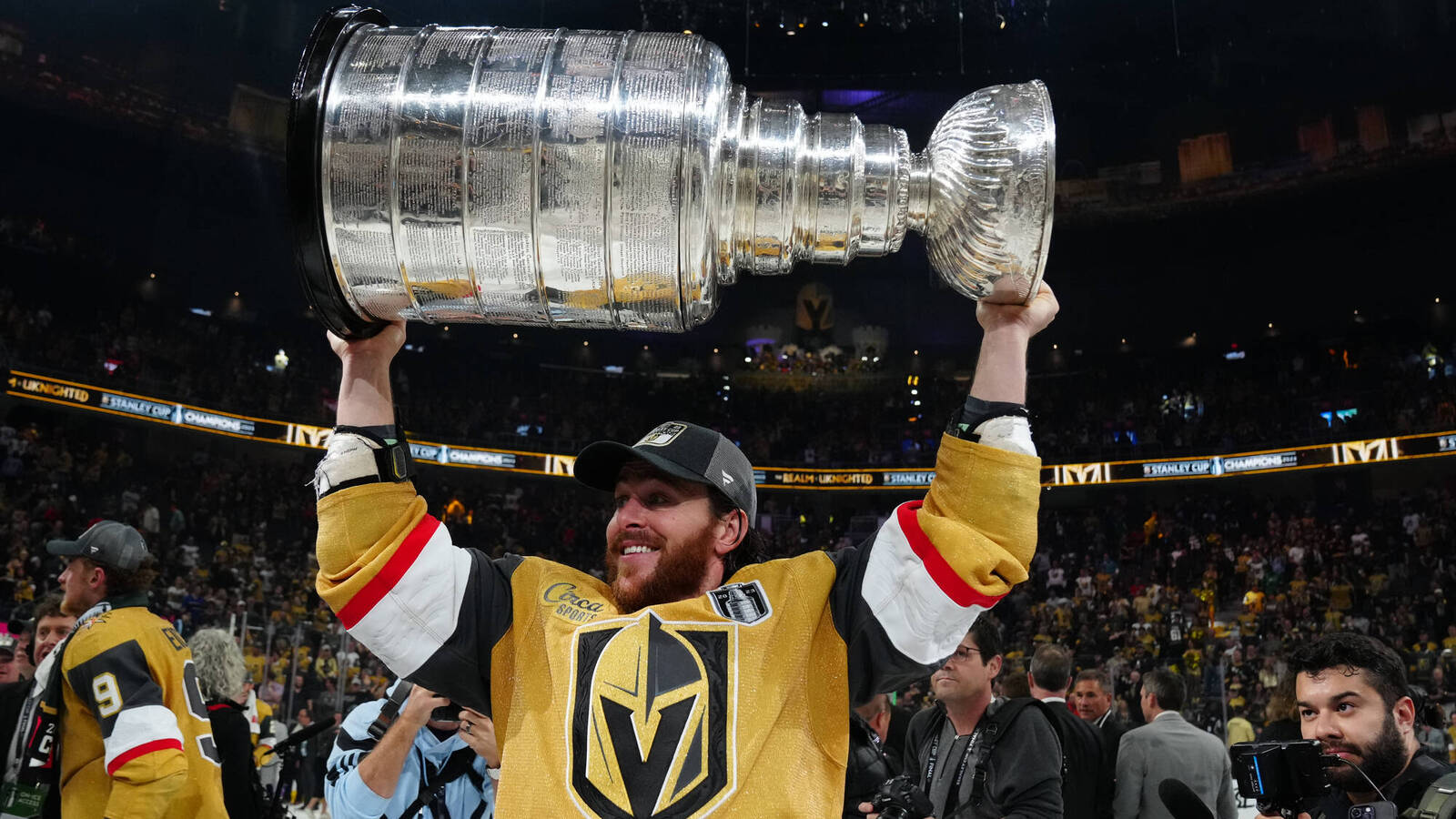
Every Conn Smythe winner in NHL history
The ultimate goal of any NHL player is to hoist the Stanley Cup. However, there is another trophy that is pretty great to lift when the playoffs end. We’re talking about the Conn Smythe Trophy, which goes to the postseason’s most valuable player. The Conn Smythe has been handed out every year since 1965, almost always to a player from the winning team. And yet on occasion a player from the losing squad has been so good, he has taken home the Conn Smythe as a consolation prize. Here is every winner of the Conn Smythe since the first time it was awarded.
Connor McDavid (2024)

Reggie Leach has company. McDavid has won basically everything but a Cup at this point, including a Conn Smythe. The Oilers pushed the Panthers to seven games in the finals, and once Sergei Bobrovsky had a couple off outings, the champs lacked a compelling Conn Smythe winner. Plus, McDavid was incredible. He had 42 points in 25 playoff games, which is nearly unheard up. That included a record 34 assists.
Jonathan Marchessault (2023)

Only six years into their history, the Vegas Golden Knights won the Stanley Cup. Hey, they famously made it to the finals as an expansion team. Clearly they were ahead of the curve. Jack Eichel was added to take the Golden Knights to the next level, but it was an original Knight that won the Conn Smythe. Marchessault's 13 goals led the postseason, and it helped him take home the award.
Cale Makar (2022)

Makar had pretty much the perfect 2022. He won the Norris as the best defenseman. His Avalanche won the Stanley Cup. When that happened, Makar took home the Conn Smythe as well. Even though he plays defense, the UMass alum led Colorado with 29 points in only 20 games. Only the dynamic duo of Connor McDavid and Leon Draisaitl had more playoff points.
Andrei Vasilevskiy (2021)
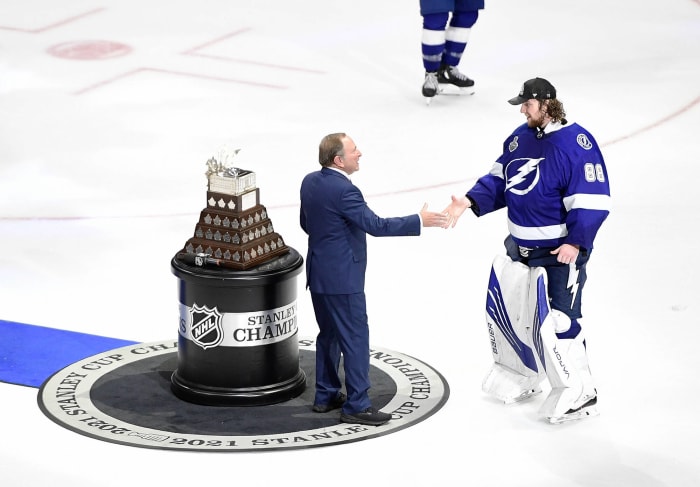
The Lightning pulled off the repeat, and this time got to do it in front of fans (though the playoffs were still weird due to the pandemic). This time, Tampa's future Hall of Famer in net won his first postseason MVP. Vasilevskiy posting a staggering 1.90 GAA and .937 save percentage, making the Russian an obvious choice.
Victor Hedman (2020)
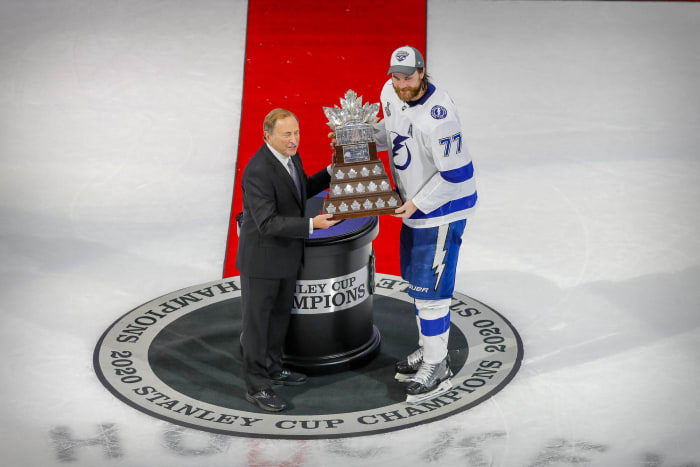
This was extremely weird postseason. The pandemic playoffs saw teams sequestered and not playing in front of fans. That took some of the panache out of the Lightning's Cup win, but not out of Hedman's performance. The defenseman was third on his team in postseason points, but 22 points in 25 games from the blue line got him the award anyway.
Ryan O'Reilly (2019)
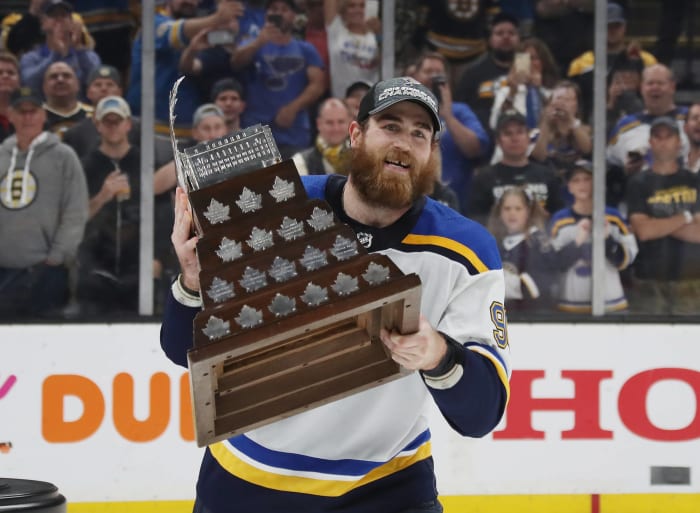
O'Reilly had put together a solid career before joining the Blues, but it wasn't all great. His time in Buffalo was somewhat of a disappointment, and he ended up getting dealt by the lowly Sabres. The move gave him a chance to bounce back big time. In addition to winning the Selke for top defensive forward, O'Reilly won the Conn Smythe by notching 23 points en route to taking St. Louis to their first Cup in franchise history.
Alex Ovechkin (2018)
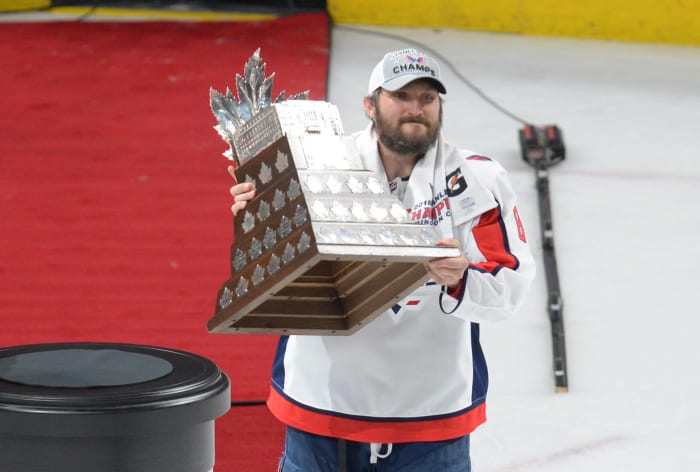
It took Ovechkin, the greatest goal scorer of his era, a long, long time to finally get over the hump. Some wondered if he would ever hoist the Stanley Cup. Then he did it, and there was no question who would get the Conn Smythe. He wasn’t able to repeat, but it wouldn’t be surprising to see the Russian take home another one someday.
Sidney Crosby (2017)

So naturally Crosby went ahead and won it again the next season. That made him the first player to win back-to-back Conn Smythes since…Mario Lemieux. Funny how that works out, huh?
Sidney Crosby (2016)

Finally Crosby, the heir apparent to Mario Lemieux (and, some argue, Wayne Gretzky) got his Conn Smythe. He already had two Art Ross Trophies and two Hart Trophies to his name, not to mention the Cup that Geno Malkin got the Conn Smythe for, but this was the cherry on top of his career.
Duncan Keith (2015)

Since Toews and Kane both had Conn Smythes already, maybe Keith was given one to shake things up. That’s not to say he wasn’t a great player for the Blackhawks for many years. Though he was not expected to become a star, the defenseman turned himself into a pivotal piece of three Cup-winning teams. His numbers have dropped significantly the last couple of years, but his heyday was tremendous for Chicago.
Justin Williams (2014)
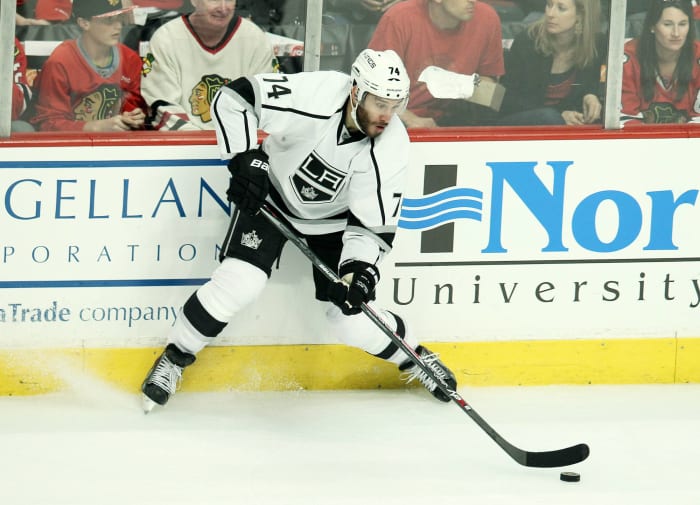
OK, so Williams probably goes down as the most surprising Conn Smythe winner. He’s been the personification of “veteran presence” for decades and has been a bit of a Zelig in terms of popping up on successful playoff teams. He also has a “record” of 8-1 in Game 7s. While Williams is nobody’s idea of a Hall of Famer, his 25 playoff points in 2014 were nothing to sneeze at.
Patrick Kane (2013)

Toews got the first Conn Smythe for the Blackhawks, so it was Kane’s turn. This was kind of a strange year, as the Calder-winning Kane had “only” nine goals and 19 points in this MVP turn. However, only one player, Boston’s David Krejci, had more than 20 points in this postseason.
Jonathan Quick (2012)
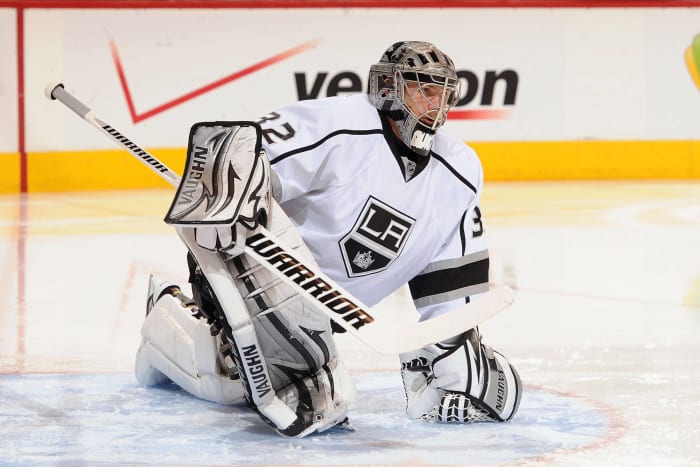
It’s back-to-back goalies winning, but Quick is, as of now, the last goalie to win the Conn Smythe. That’s a little surprising, given how many netminders have taken home the award. The Kings goalie really stood on his head in this run and helped to solidify himself in the minds of many as one of the best goaltenders in the NHL.
Tim Thomas (2011)
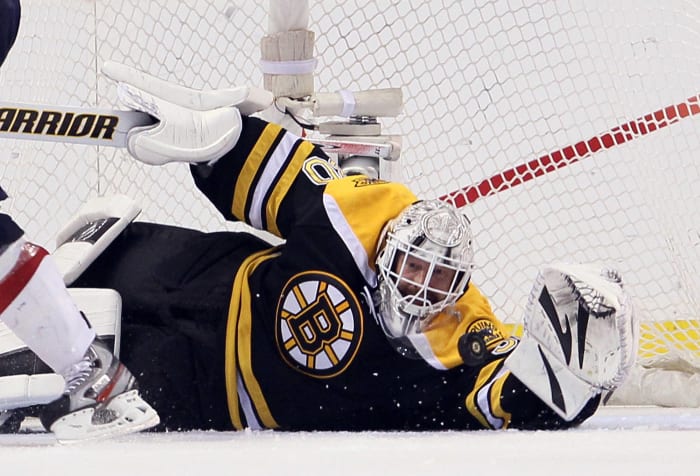
Thomas is the most recent winner of the Conn Smythe no longer active in the NHL. The goalie had a strange career. It took him a while to get it going, and then suddenly he was the best goalie in the world for a couple of years. He won two Vezinas despite having only 426 NHL games to his name, and he also won this one Conn Smythe.
Jonathan Toews (2010)
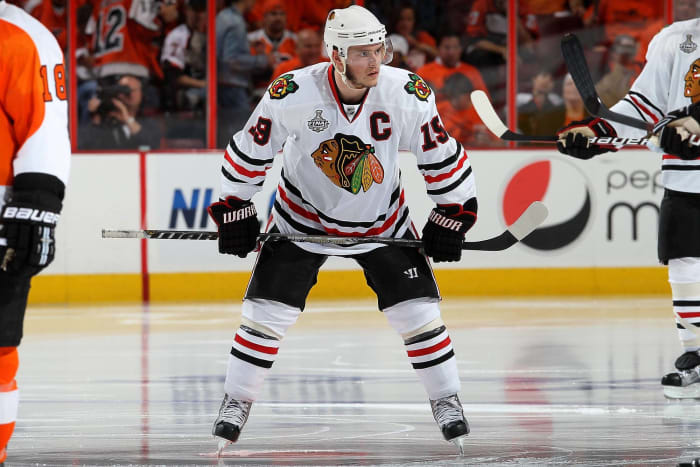
The Blackhawks ended a long title drought in 2010, and the dynamic duo of Toews and Patrick Kane led the charge. Naturally, though, it’s the guy known as “Captain Serious” who was declared the MVP. It was a close battle, as Toews had only one more point than Kane, but the whole “captain” thing probably helped carry the day.
Evgeni Malkin (2009)

Zetterberg played great in 2009 as well, but the Penguins upended Detroit’s plans at a repeat. While Sidney Crosby has always overshadowed Malkin, the Russian has had an excellent career of his own. He also had the honor of being the first of the two to win a Conn Smythe, which was paired with an Art Ross in 2009 as well.
Henrik Zetterberg (2008)

Zetterberg recently retired a Red Wings legend, and a former captain, thanks in part to his role in the 2008 Stanley Cup win. After having the best regular season of his career with 92 points, Z led the postseason in scoring with 27 points. In time, his No. 40 will be retired by the Wings, and this run will be a big reason why.
Scott Niedermayer (2007)
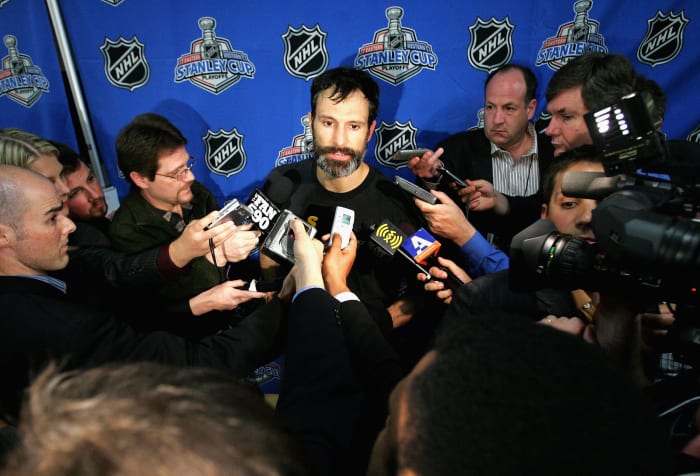
Niedermayer won three Cups with the Devils but zero Conn Smythe Trophies. As a seasoned veteran with a salt-and-pepper beard, he finally got his Conn Smythe, but not with New Jersey. Instead, he won it with Anaheim, giving the franchise its first Cup thanks to his strong defensive play. The beard probably helped too.
Cam Ward (2006)
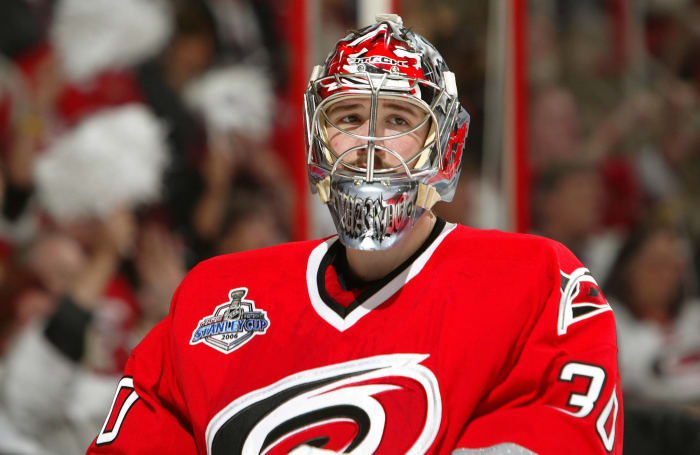
There was no season in 2005, thanks a lot Gary Bettman, so there was no Conn Smythe winner. That means the next winner was a young goalie named Cam Ward, who has had a weird career. After this high so early in his run, he quickly turned into a mediocre goalie who was more of a burden on the Hurricanes than a benefit.
Brad Richards (2004)
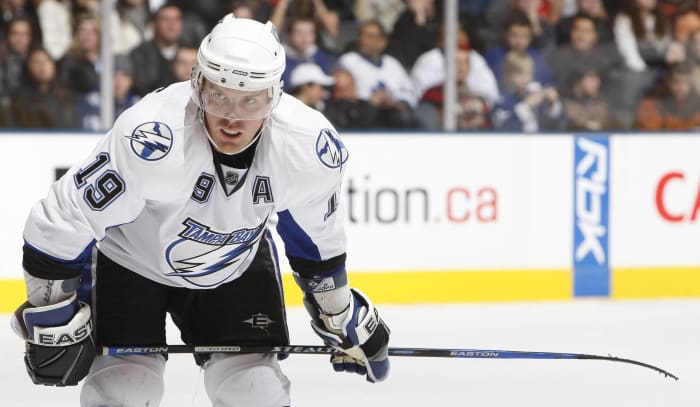
Vincent Lecavalier and Martin St. Louis were the two big names for the Tampa Bay Lightning of 2004. Neither of them won the Conn Smythe, though. That award went to Richards, and he earned it. A fine player in his own right, he notched 26 points in 23 playoff games.
Jean-Sebastien Giguere (2003)
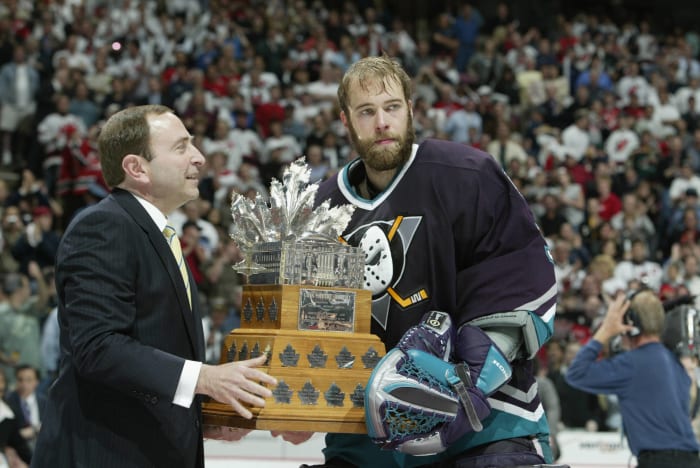
For the first time in a long time, and the last time as of present, we have a player from a losing team winning the Conn Smythe. Giguere was truly amazing in leading the Mighty Ducks to the finals. He put together one of the best performances in memory, but it wasn’t quite enough. It also showed us just how hard it is for a losing player to win the Conn Smythe in modern times.
Nicklas Lidstrom (2002)
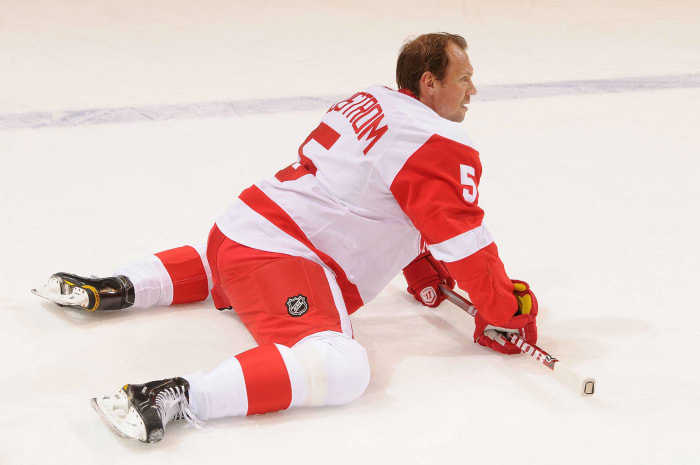
For years, Lidstrom was the best defenseman in the NHL. He won a whopping seven Norris Trophies in his career, and yet somehow that feels like it’s not enough. There were many other trophies in the Swedes career, though, including this one claiming of the Conn Smythe.
Patrick Roy (2001)
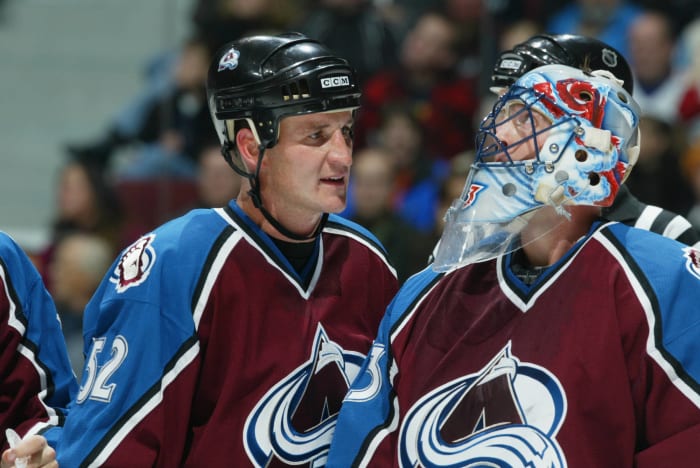
Yes, that makes three Conn Smythes for Roy. That is in fact a record. No other player has been named playoff MVP more than twice, and right now there is only one player who has a chance of trying it at some point in the future, though it won’t happen this year. This was also Roy’s first win of this award with the Avalanche.
Scott Stevens (2000)

Stevens patrolled the blue line for the Devils for many years, going from being a big-time scorer into a defensive stalwart. He became a force at goal prevention during the trap days. Stevens scored only 11 points in this entire playoff run, but his play was still so impressive he won the Conn Smythe.
Joe Nieuwendyk (1999)
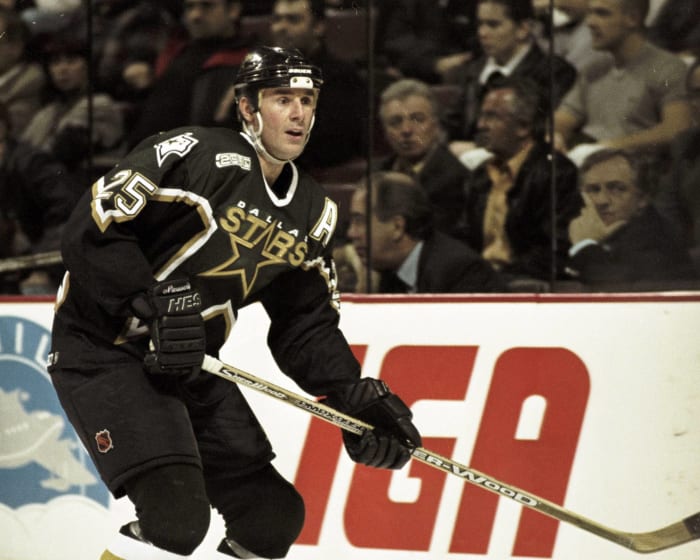
Brett Hull and his skate in the crease is all everybody remembers, but Hull didn’t get the MVP despite scoring the series-winning goal. Nieuwendyk is no slouch, of course, as he made the Hall of Fame in 2011. The former Flames captain also won the Calder for rookie of the year and would eventually become the general manager of the Dallas Stars. It wasn’t as successful a run as his playing career.
Steve Yzerman (1998)
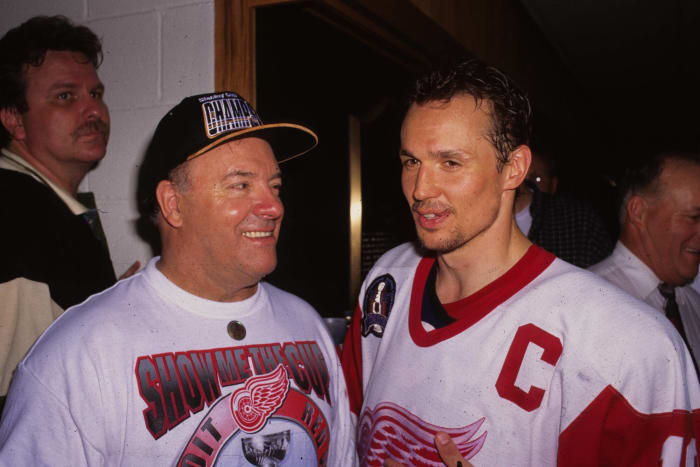
That’s more like it. The guy called the “The Captain” in Detroit needed a Conn Smythe. He was the focal point of the franchise for over a decade at this point and had changed his game to service the team’s needs. It would have felt weird for him to never be a Conn Smythe winner. He got to win once in 1998.
Mike Vernon (1997)
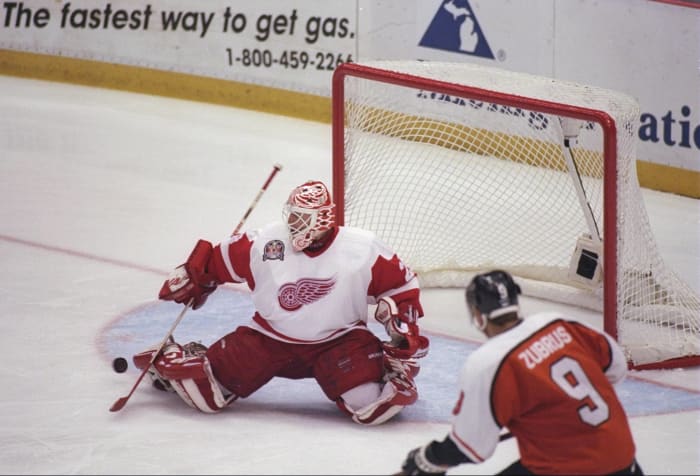
Much as the Rangers in 1994, the Red Wings ended a huge drought in 1997. And as with the Rangers, it wasn’t one of the names you’d most expect who won the Conn Smythe. Nope, instead of a Detroit legend, it was Vernon, who had also tended goal for the Flames in 1989. He didn’t win a Conn Smythe that year, though. Waiting until 1997 probably was just fine with him.
Joe Sakic (1996)

Speaking of Claude Lemieux, he would join the Avalanche and get himself another Cup in 1996. This time, though, he wouldn’t sniff the Conn Smythe. Instead, future Hall of Famer and team captain Sakic was named playoff MVP. The Avalanche had just moved to Colorado from Quebec, and Sakic helped make the move a memorable one right off the bat.
Claude Lemieux (1995)
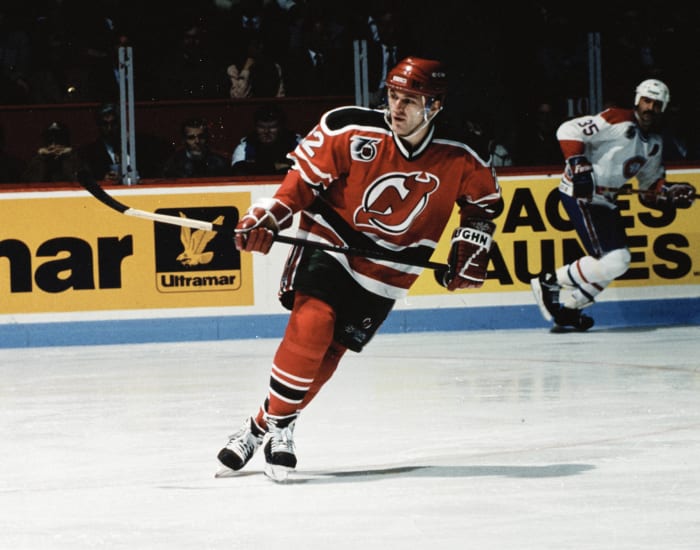
Lemieux is another surprising winner. The Devils helped turn the NHL into a slog for a few years with their neutral zone trap, and then they got some great goaltending from Martin Brodeur as well. Lemieux was a good player, but he’s probably the worst player to win the Conn Smythe at this point in history, and perhaps ever.
Brian Leetch (1994)
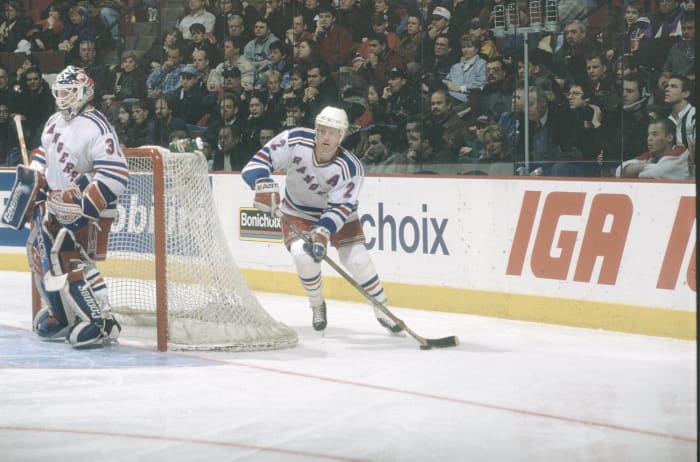
Mark Messier was the captain of the Rangers team that ended a 54-year title drought, and he’s the one who made the big guarantee. And yet he didn’t win the Conn Smythe. Instead that went to Leetch, who had a great career in his own right. You would have guessed Messier, or maybe even Mike Richter, but nope, it was Leetch.
Patrick Roy (1993)
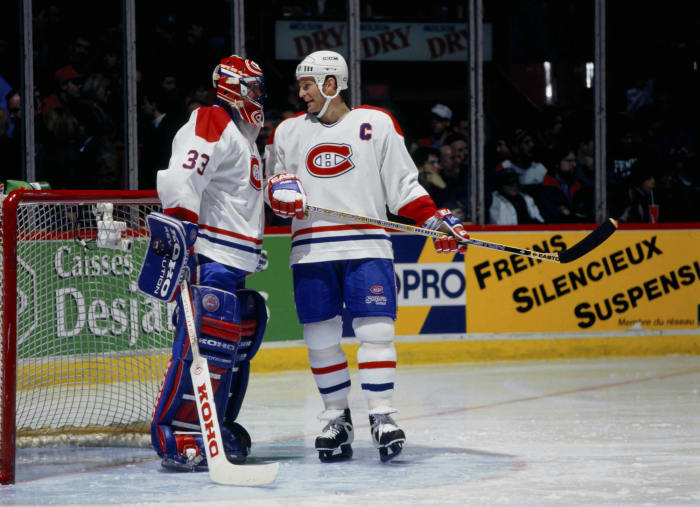
Several years after winning a Conn Smythe as a 20-year-old rookie, Roy grabbed his second playoff MVP. The netminder helped the Canadiens take down the Los Angeles Kings, led by Wayne Gretzky. However, Marty McSorely’s illegal curve on his stick has an argument for being the MVP as well.
Mario Lemieux (1992)

And then Mario did it again. Lemieux couldn’t quite live up to the 44 points he had in 1991, but in 1992 he scored 34 points in eight fewer games. Yes, despite the fact Lemieux missed a few playoff contests, he still managed 34 points in only 15 games and got himself the Conn Smythe despite his absence.
Mario Lemieux (1991)
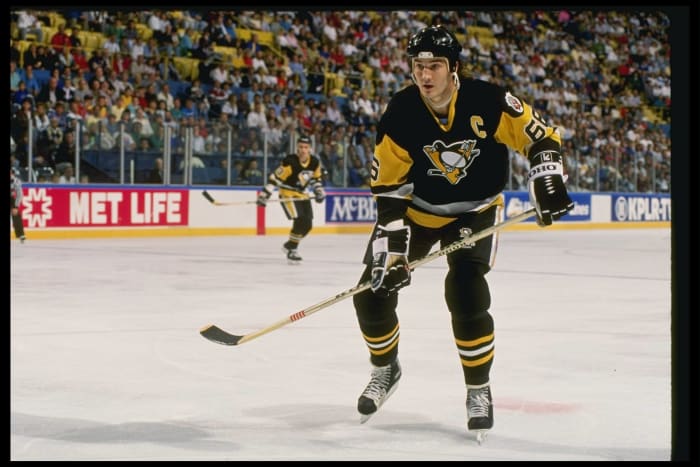
Lemieux battled Gretzky for being the best player in the NHL in the late ‘80s and early ‘90s. Super Mario had a great career that could have been even better if not for injuries and illnesses. This year Lemieux had a staggering campaign, as he scored a whopping 44 points in the playoffs. Only Gretzky has ever notched more in one postseason.
Bill Ranford (1990)
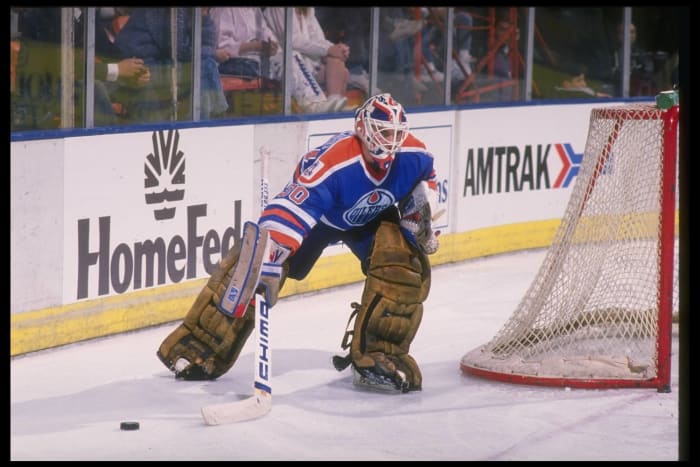
When you think about the Edmonton Oilers dynasty, you think about the forwards, not really the goalies. Also, when you think of great netminders, you don’t think of Bill Ranford. That’s probably because Ranford wasn’t all that great of a goalie in his career. However, for one postseason he embodied the “hot goalie” archetype and got some hardware.
Al MacInnis (1989)
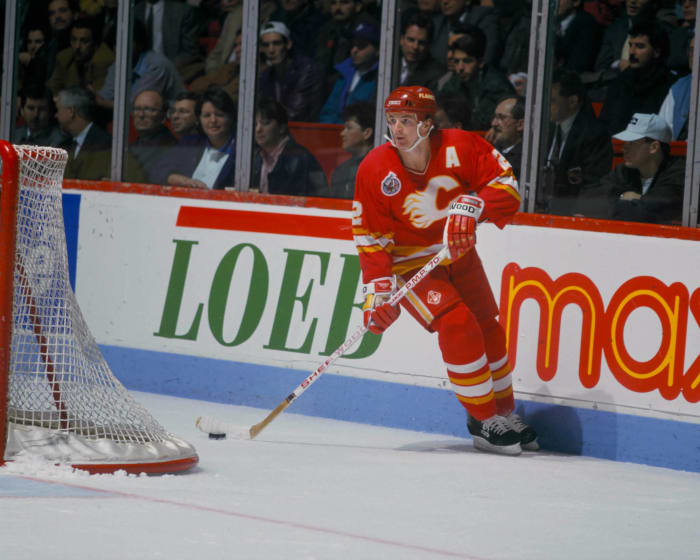
It feels like it’s forgotten that MacInnis and his booming slap shot won a Conn Smythe. That is, unless you are a Calgary Flames fan. The defenseman helped get the franchise its only Cup and sent beloved Flames legend Lanny McDonald into retirement with a ring.
Wayne Gretzky (1988)
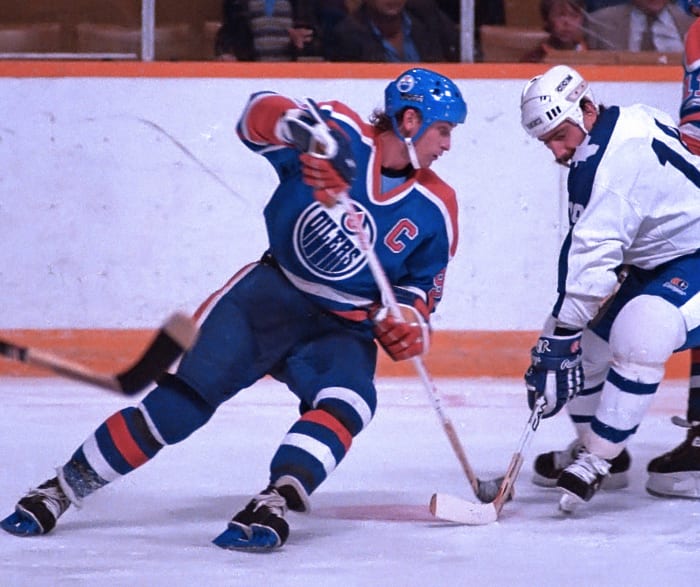
Gretzky is back at it for his second Conn Smythe in what would become the final Stanley Cup he ever won. Unsurprisingly, the only man to have his number retired by the NHL has the most career goals, assists and points in postseason play.
Ron Hextall (1987)

After a long break, another player on a losing team emerged as a Conn Smythe winner. Hextall did everything he could to get the Flyers a Cup, but his efforts fell short against an Oilers juggernaut. Sure, his 2.77 GAA and .908 save percentage in the playoffs don’t look great by modern standards, but remember this was the ‘80s. If a goalie had a save percentage over .900, he was doing something right.
Patrick Roy (1986)
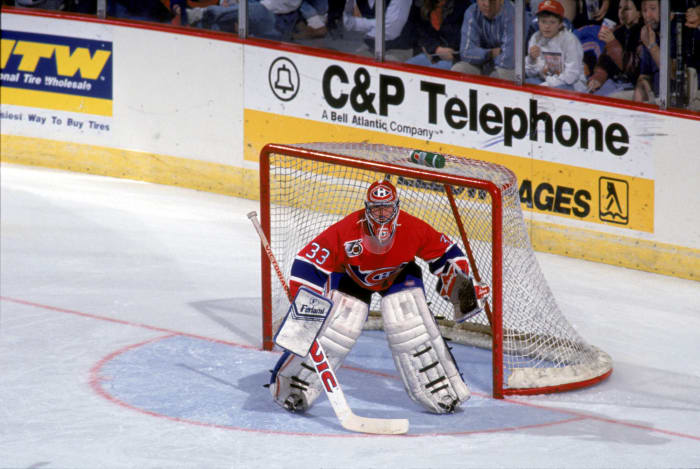
Much like Ken Dryden before him, Roy won a Conn Smythe for the Canadiens in his first season with the team. Though he started only 47 games during the regular season, at 20 he became the youngest Conn Smythe winner ever.
Wayne Gretzky (1985)
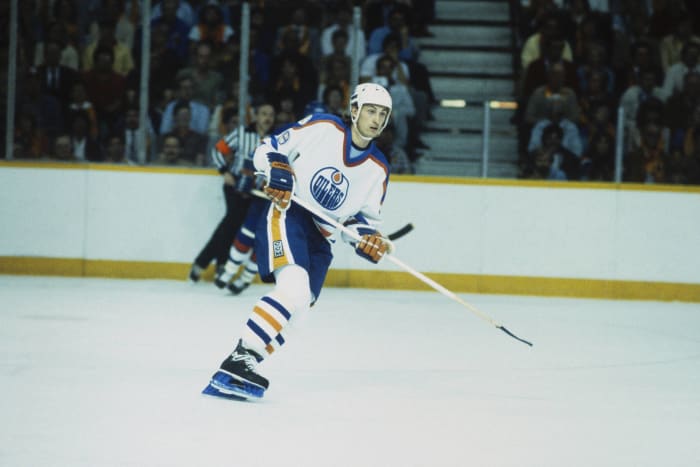
The Great One didn’t have to wait long to get his Conn Smythe, of course. It took only one more season and one more Cup run. What can we say about the most prolific point scorer in NHL history that you haven’t already heard? Gretzky was great, and he was great in these playoffs.
Mark Messier (1984)
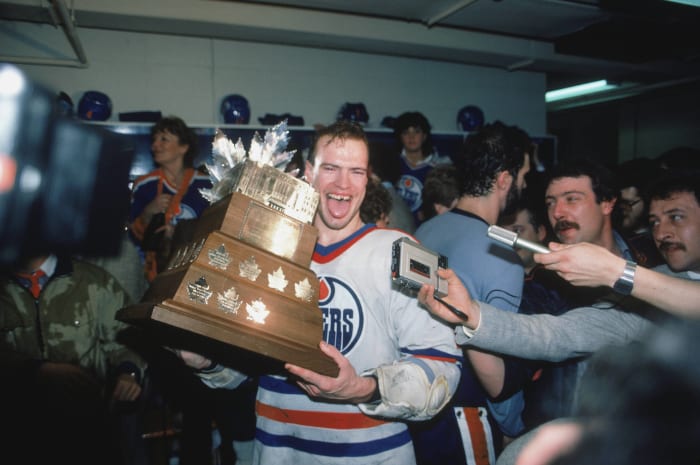
In a mild upset, Messier beat his teammate Wayne Gretzky to win a Conn Smythe. Both guys contributed a ton in Edmonton’s first Cup run, but Messier got the nod. In addition to scoring 26 points, Mess scored a crucial goal in the Final against the Islanders, which may have pushed him over the edge.
Billy Smith (1983)
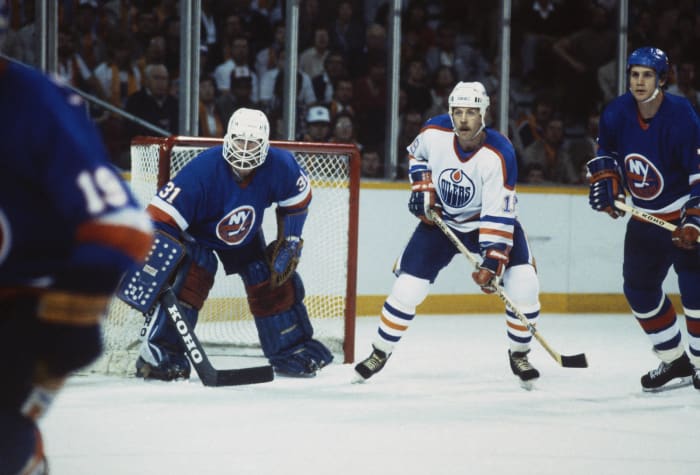
And with the Islanders' last of four consecutive Stanley Cups, goalie Billy Smith finally gets a Conn Smythe. However, this is not the most noteworthy thing to happen in Smith’s career. He was the first goalie ever credited with a goal, though it was not one he actually shot into a net. Still, it’s a bit of history.
Mike Bossy (1982)
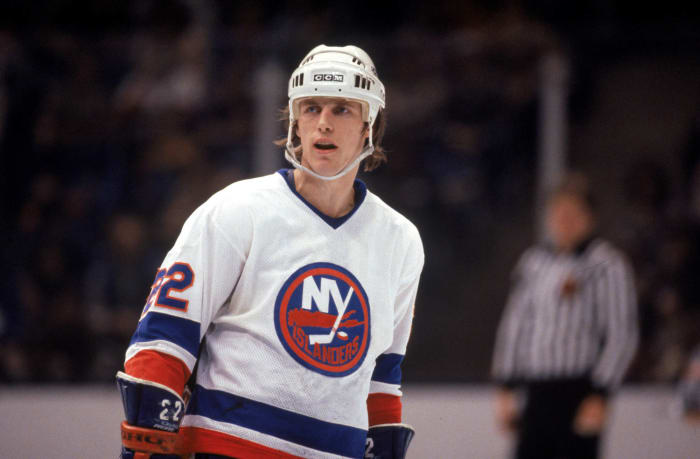
Now this is the name you expect to see when you think stars of the ‘80s Islanders. Bossy was an incredible goalscorer, and the only thing that kept him from adding to his 573 career goals is an injury-shortened career. This is a guy who never failed to score 50 or more goals in a full season. Are you surprised that he scored 17 goals in three straight playoffs, getting one Conn Smythe for his troubles?
Butch Goring (1981)
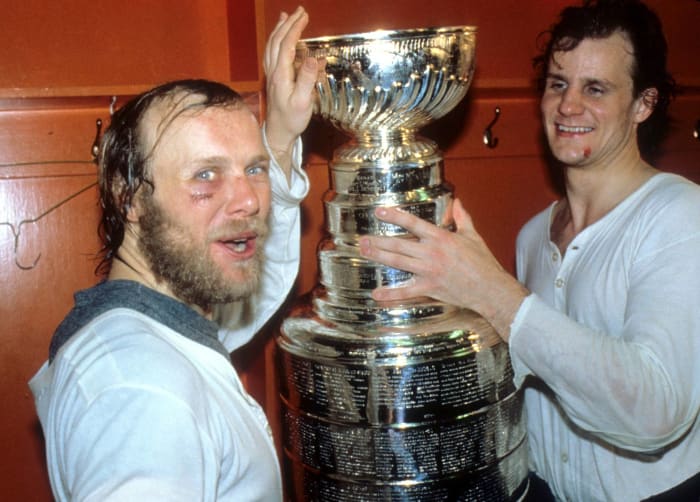
The Islanders of the ‘80s had a few huge names, and Goring is not one of them. He’s not even in the Hall of Fame, which isn’t a knock, but it makes him stand out among early Conn Smythe winners. For one year, though, he managed 20 points in 18 games, and the man credited with popularizing the playoff beard got some hardware.
Bryan Trottier (1980)
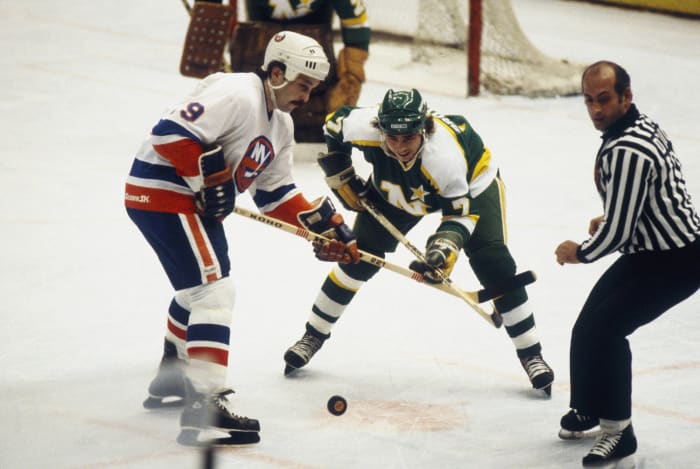
The Islanders won four Cups in a row, so get ready to spend a little time on Long Island. Trottier was the first of the bunch to win a Conn Smythe in the team’s first-ever championship victory. It would be his only win, as no Islander managed to double up during this four-year run.
Bob Gainey (1979)
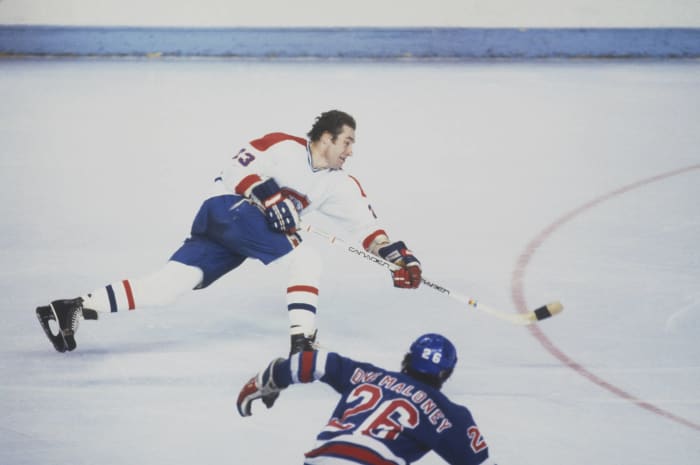
Gainey notched 16 points in the playoffs, which is good, but scoring was never Gainey’s calling card. He was, to some, the greatest defensive forward ever. Don’t believe us? Well, the four straight Selke Trophies he won for his defensive play would argue otherwise.
Larry Robinson (1978)

So the Canadiens had a player nicknamed “The Roadrunner” (Yvan Cournoyer) and also a guy nicknamed “Big Bird” in Robinson? And they both won Conn Smythe Trophies? What an odd world. Robinson is also notable because in addition to winning a Conn Smythe as a player, he won a Stanley Cup as a coach with the New Jersey Devils.
Guy Lafleur (1977)
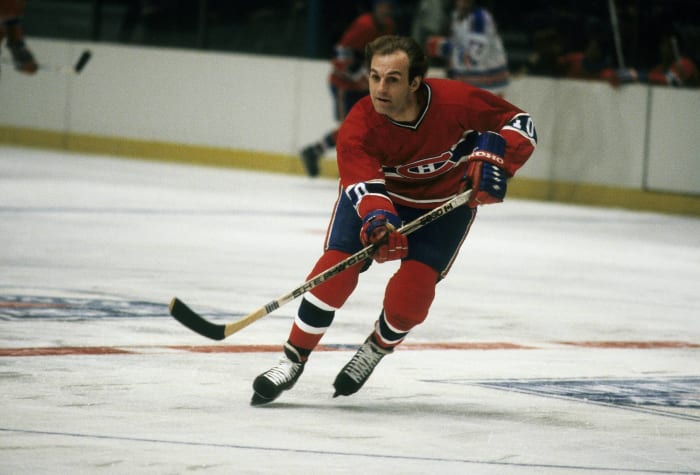
"The Flower" changed the game in the NHL in some ways. He was the first player to tally 50 goals and 100 points in six straight seasons. Lafleur took home five Cups in his career but only one Conn Smythe. He would lead the NHL in scoring for three straight playoffs, but this is the only time he was given the postseason MVP honor.
Reggie Leach (1976)
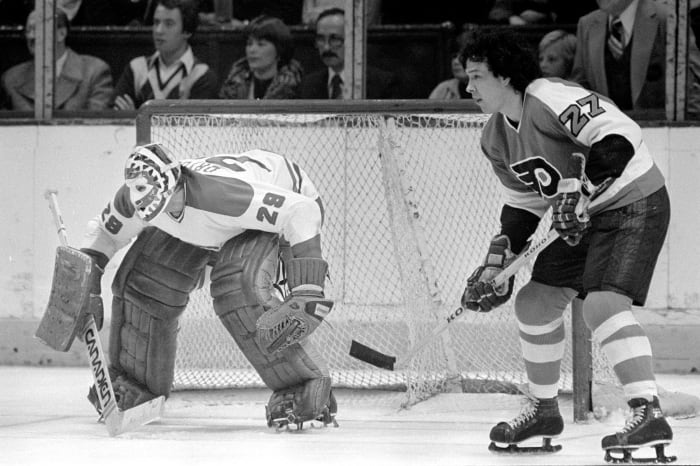
Leach is the third Flyers player in a row to win the Conn Smythe. However, that’s not because Philadelphia had a threepeat. The Flyers lost in the Final in 1976, but Leach still was named playoff MVP. As a forward, he was the only non-goalie from a losing team to win this trophy for many years.
Bernie Parent (1975)

Well what are we supposed to say about Parent now? We were just talking about him! We could say that Parent became the first, but not last, player to win back-to-back Conn Smythe Trophies. Only one person could be the first, though, and that honor forever belongs to the Flyers netminder.
Bernie Parent (1974)

The Flyers became the first expansion team to win a Cup, in 1974, and they can thank Parent for that. The Hall of Fame goalie put up some great numbers in the playoffs, and all season, including posting a shutout in the clinching game of the Final.
Yvan Cournoyer (1973)
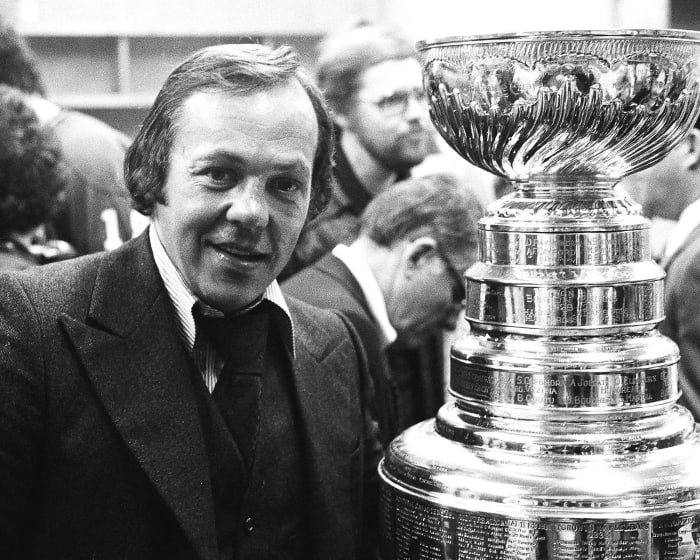
Though Cournoyer is in the Hall of Fame, he’s far from the first name that comes to mind when you think of legendary Canadiens. Don’t worry: Montreal starts winning far less Cups awfully quickly. Though he was only 5-foot-7, the player nicknamed “The Roadrunner” scored an impressive 15 goals in the playoffs to earn his trophy.
Bobby Orr (1972)

Yes, Orr is back. The Bruins won another Cup, so of course he was the MVP. This was the last time the Bruins would win it all for many years and also was the final Cup of Orr’s career, which was unfortunately truncated by injury. Still, he is one of only a handful of players with more than one Conn Smythe and the only defenseman to do so.
Ken Dryden (1971)
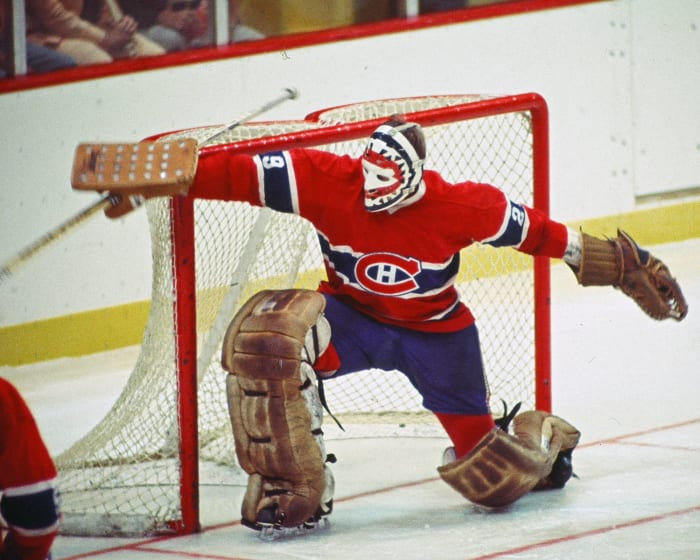
Sure, it’s another Canadien, but at least this time it’s the goalie from a winning team. Here’s something crazy. Dryden won the Conn Smythe the season BEFORE he won the Calder as Rookie of the Year. The netminder had played in only six regular-season games before taking over in net for the playoffs in 1971, which is why he remained eligible for the Calder.
Bobby Orr (1970)

Ever heard of him? Naturally, when the Bruins won their first Cup in decades, their iconic defenseman led the charge. Orr changed the game as a player. This season, he won the Art Ross, Norris, and Hart to go with the Conn Smythe. Oh, and this was also the playoffs where the famous photo of him was taken.
Serge Savard (1969)
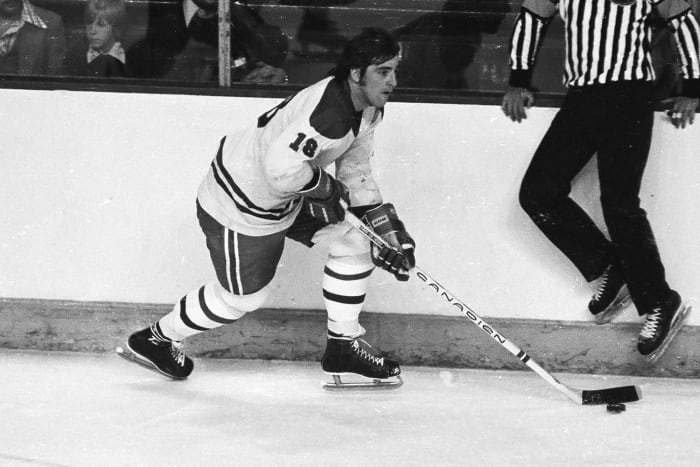
We’ve got another Canadien but our first defenseman. The future Hall of Famer is credited with popularizing the spin-o-rama (along with the similarly named Denis Savard) and won eight Cups total with Montreal. He was also the second-to-last player from the Original Six era of the NHL to be an active player.
Glenn Hall (1968)
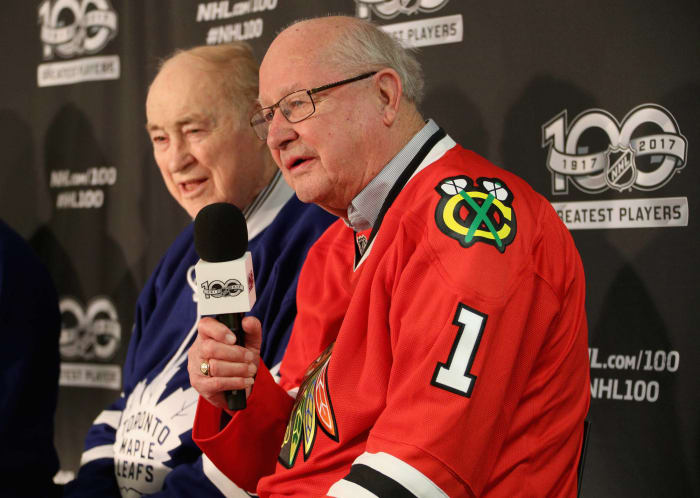
OK, so clearly the NHL was still figuring out this award early on. Hall is the fourth winner of the Conn Smythe and the second to come from the losing team. That’s right. At this point in NHL history, there were as many playoff MVPs from losing teams as from winning teams. This would change quickly. Hall played goalie for St. Louis, which was an expansion team this year.
Dave Keon (1967)
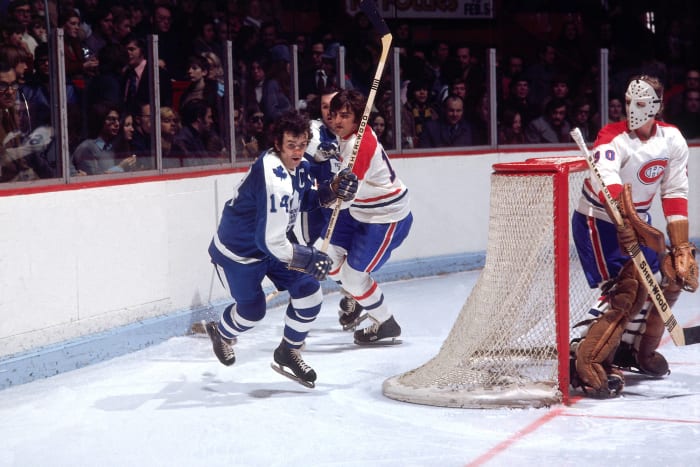
The last time the Maple Leafs won the Stanley Cup, Keon was the hero. It was the fourth Cup he won with Toronto, but the only one for which the Conn Smythe was around. Keon managed just eight points in the 1967 playoffs, which makes him the lowest-scoring player (other than goalies, of course) to win the Conn Smythe.
Roger Crozier (1966)
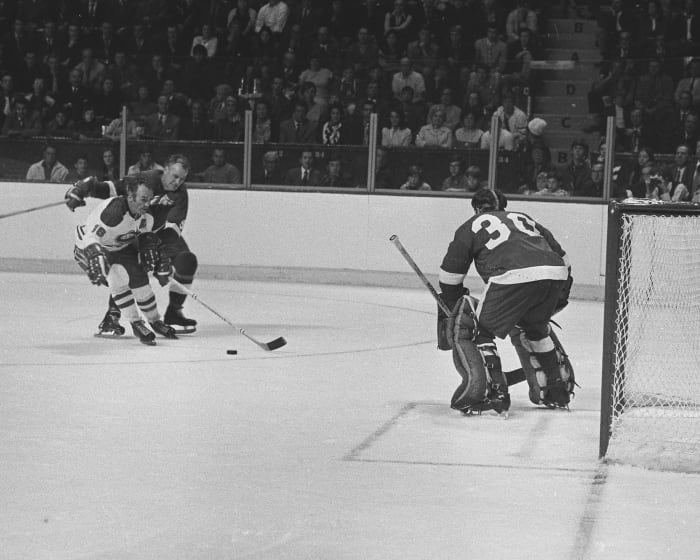
Almost right out of the gate, the Conn Smythe voters threw us a curveball. It was not by voting for a goalie; goalies often win this award. No, it was because Crozier played goalie for the Red Wings, and they didn’t win the Cup this year. That’s right, the second-ever winner of the Conn Smythe played for the losing team.
Jean Beliveau (1965)
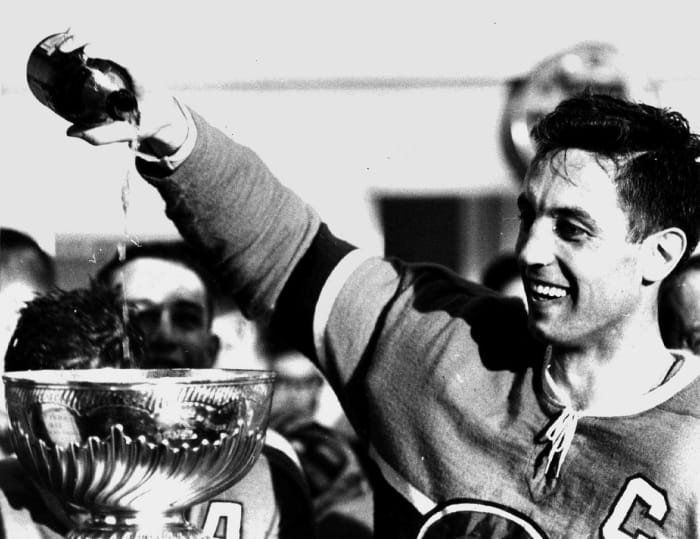
The player who ends up winning the Conn Smythe isn’t always a star, but that wasn’t the case the first time the award was handed out. Beliveau is a legendary Montreal Canadien. It also feels fitting that the first winner of the Conn Smythe played for the team with the most Stanley Cups in history.
Chris Morgan is a Detroit-based culture writer who has somehow managed to justify getting his BA in Film Studies. He has written about sports and entertainment across various internet platforms for years and is also the author of three books about '90s television.
More must-reads:
- Penguins prospect Tanner Howe undergoes ACL reconstruction surgery
- Avalanche's Gabriel Landeskog makes his long-awaited return to lineup
- The 'Most 30-goal seasons in NHL history' quiz
Breaking News
Trending News
Customize Your Newsletter
 +
+
Get the latest news and rumors, customized to your favorite sports and teams. Emailed daily. Always free!
PRIVACY POLICY EDITORIAL POLICY CONTACT US
ABOUT YARDBARKER TERMS OF SERVICE
Use of this website (including any and all parts and
components) constitutes your acceptance of these
Terms of Service and Privacy Policy.
This site is for entertainment purposes only.
There is no gambling offered on this site.
Gambling Problem? Call 1-800-Gambler.








